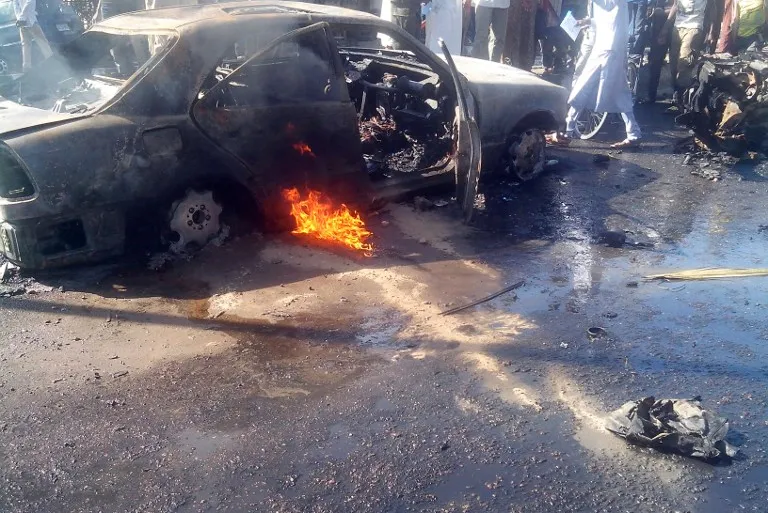Deadly Roadside Bomb in Borno Kills 26, Highlights Persistent Militant Threat
MAIDUGURI, Nigeria – April 29, 2025
A roadside bomb detonated by suspected Boko Haram militants killed at least 26 people in Nigeria’s northeastern Borno State on Monday, April 28, in one of the deadliest attacks this year. The explosion, which obliterated a truck carrying men, women, and children near the Cameroon border, underscores the ongoing threat posed by jihadist groups in the region despite government claims of progress.
Attack Details
- Location: The blast occurred on the road between Rann and Gamboru, a route frequently targeted by militants due to its use by displaced communities for supply trips.
- Casualties:
- 26 killed: 16 men, 4 women, and 6 children died instantly, with most victims “charred beyond recognition” according to witnesses.
- 3 injured: Survivors were hospitalized with severe burns and shrapnel wounds.
- Aftermath:
- Bodies were wrapped in white plastic bags and taken to Rann General Hospital’s morgue, where a resident described the scene as “horrific”.
- Funerals were held in Rann, home to over 50,000 displaced people already traumatized by years of violence.
Context of Violence
The attack is part of a broader surge in jihadist activity:
- Weekend Attacks:
- Adamawa: Boko Haram killed 10 vigilantes from the Civil Joint Task Force (CJTF) in Kopre village1.
- Gwoza District: 14 farmers were executed in a separate raid.
- April Escalation:
- April 13: A roadside bomb killed 8 bus passengers on the Damboa-Maiduguri highway.
- March 21: An IED explosion in Biu killed 4 and injured 4 others.
Militant Tactics and Territorial Control
- IEDs and Landmines: Boko Haram and ISWAP increasingly plant explosives along highways to target civilians and security forces.
- Drone Warfare: ISWAP has deployed armed drones against military installations, signaling access to advanced technology and external support.
- Territorial Gains: Governor Babagana Zulum warned that militants are regrouping in Lake Chad islands, Sambisa Forest, and Mandara mountains, exploiting reduced military presence.
Humanitarian Crisis
- Displacement: Over 2 million people remain displaced across Borno, Adamawa, and Yobe states, with many reliant on dangerous supply trips.
- Aid Worker Risks:
- NGOs face attacks, abductions, and office raids, such as the March 19 INTERSOS breach in Monguno.
- The Maiduguri-Monguno route remains a hotspot for ambushes and illegal checkpoints.
Government Response and Criticism
- Official Claims: Federal authorities insist militants are “mostly defeated,” but attacks persist.
- Local Outcry:
- Residents accuse the military of inadequate protection, citing frequent redeployments to other crisis zones.
- Governor Zulum has repeatedly urged federal authorities to reassess security strategies.
Expert Analysis
- Tactical Shift: Militants are avoiding direct clashes, instead relying on IEDs and drones to maximize casualties with minimal risk.
- Regional Implications: Violence is spilling into Cameroon, Chad, and Niger, straining the Multinational Joint Task Force’s capacity.

















